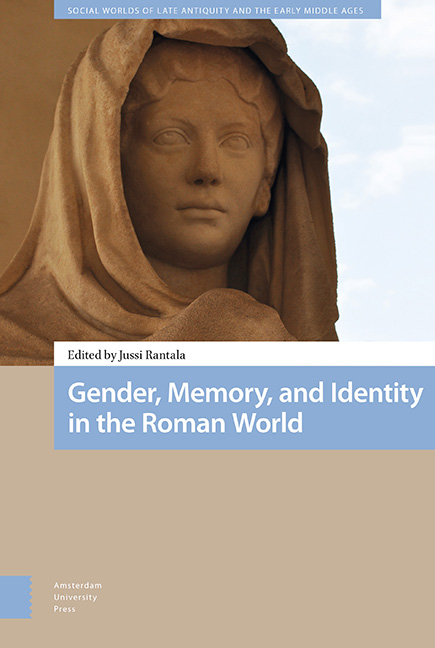Book contents
- Frontmatter
- Contents
- List of Illustrations
- Abbreviations
- Preface
- Tabula Gratulatoria
- Introduction
- 1 Public Agency of Women in the Later Roman World
- 2 Religious Agency and Civic Identity of Women in Ancient Ostia
- 3 The Invisible Women of Roman Agrarian Work and Economy
- 4 ‘Show them that You are Marcus’s Daughter’
- 5 Defining Manliness, Constructing Identities
- 6 ‘At the Age of Nineteen’ (RG 1)
- 7 Conflict and Community
- 8 Dress, Identity, Cultural Memory
- 9 The Goddess and the Town
- 10 Varius, multiplex, multiformis – Greek, Roman, Panhellenic
- 11 Mental Hospitals in Pre-Modern Society
- Index
9 - The Goddess and the Town
Published online by Cambridge University Press: 20 November 2020
- Frontmatter
- Contents
- List of Illustrations
- Abbreviations
- Preface
- Tabula Gratulatoria
- Introduction
- 1 Public Agency of Women in the Later Roman World
- 2 Religious Agency and Civic Identity of Women in Ancient Ostia
- 3 The Invisible Women of Roman Agrarian Work and Economy
- 4 ‘Show them that You are Marcus’s Daughter’
- 5 Defining Manliness, Constructing Identities
- 6 ‘At the Age of Nineteen’ (RG 1)
- 7 Conflict and Community
- 8 Dress, Identity, Cultural Memory
- 9 The Goddess and the Town
- 10 Varius, multiplex, multiformis – Greek, Roman, Panhellenic
- 11 Mental Hospitals in Pre-Modern Society
- Index
Summary
Abstract
An analysis of the figure and cult of Lucia, the patron saint of Syracuse, deals with the complex relationships between gender, identity, and cultural memory. The cult has a strong identity value connected with the construction of the civic identity and the cultural and political space, with inherited aspects of the previous Greek cult of Demeter and Kore. The passage from the Graeco-Roman culture to the Christian one cannot be reduced to a continuous process of transcultural hybridization. Lucia ‘becomes’ Demeter and Kore through a slow process mainly during the seventeenth and eighteenth centuries. Later, by tourist connection with modern Swedish tradition of Lucia, the feast in Syracuse has eventually metabolized some sexual elements that were present in the ancient Greek cult.
Keywords: cultural heritage, Demeter, Kore, St. Lucia, Skansen, Syracuse, Sweden, tourism
The temple and the church: Syracuse between past and present
Italy, as you probably know, is a strange place. Since the Grand Tour times, travellers from northern Europe have flocked to the ‘beautiful country’ to admire, possibly under the sun that so often shines in the Mediterranean regions, the grand ruins of the Italian past, visible vestiges of ancient glories, and touching memories of human caducity. They were also in search of the many art treasures, hidden in churches, private palaces, and collections, which were to become part of the first European museums. From this point of view, Italy was conceived as a ‘diffused museum’, to use a modern definition, but with a remarkable difference: it was possible to buy almost everything.
Yet the most fascinating thing for these travellers was perhaps the possibility of seeing an odd living world, where past and present, and sacred and profane, lived together: flocks and shepherds around wonderful ruins, even in the centre of Rome, on the remains of the ancient forums; peasants living in a miserable but fascinating way, with their ancient superstitions and curious traditions; and grand, rich, and colourful religious festivals where the Roman Catholic faith seemed to meet unrestrained forms of pagan leisure.
This oddity is at the basis of what we now call the ‘tourist gaze’: an active gaze capable of transforming the space and the local culture insofar as residents tend to meet the image that tourists have of the place they are visiting.
- Type
- Chapter
- Information
- Gender, Memory, and Identity in the Roman World , pp. 239 - 282Publisher: Amsterdam University PressPrint publication year: 2019



